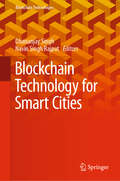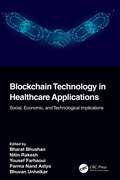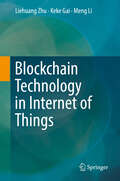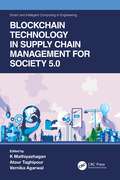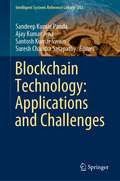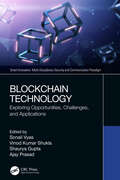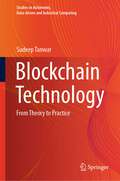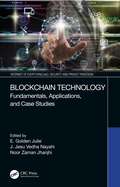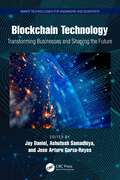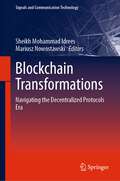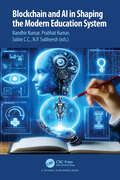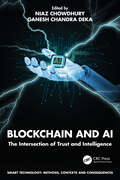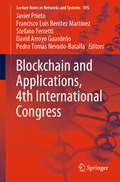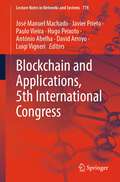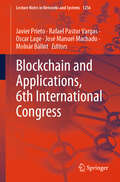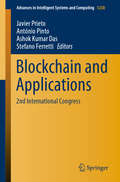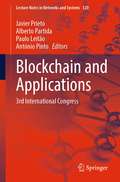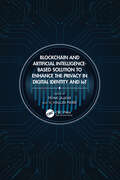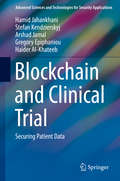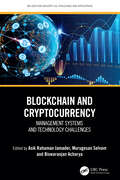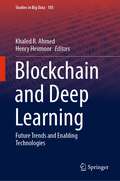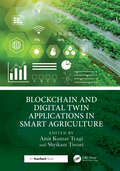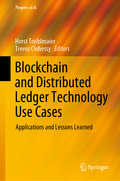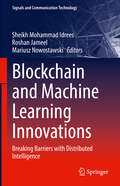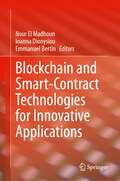- Table View
- List View
Blockchain Technology for Smart Cities (Blockchain Technologies)
by Dhananjay Singh Navin Singh RajputThis book provides a comprehensive overview of various aspects of the development of smart cities from a secure, trusted, and reliable data transmission perspective. It presents theoretical concepts and empirical studies, as well as examples of smart city programs and their capacity to create value for citizens. The contributions offer a panorama of the most important aspects of smart city evolution and implementation within various frameworks, such as healthcare, education, and transportation. Comparing current advanced applications and best practices, the book subsequently explores how smart environments and programs could help improve the quality of life in urban spaces and promote cultural and economic development.
Blockchain Technology in Healthcare Applications: Social, Economic, and Technological Implications (Advances in Smart Healthcare Technologies)
by Bharat BhushanTremendous growth in healthcare treatment techniques and methods has led to the emergence of numerous storage and communication problems and need for security among vendors and patients. This book brings together latest applications and state-of-the-art developments in healthcare sector using Blockchain technology. It explains how blockchain can enhance security, privacy, interoperability, and data accessibility including AI with blockchains, blockchains for medical imaging to supply chain management, and centralized management/clearing houses alongside DLT. Features: Includes theoretical concepts, empirical studies and detailed overview of various aspects related to development of healthcare applications from a reliable, trusted, and secure data transmission perspective. Provide insights on business applications of Blockchain, particularly in the healthcare sector. Explores how Blockchain can solve the transparency issues in the clinical research. Discusses AI with Blockchains, ranging from medical imaging to supply chain management. Reviews benchmark testing of AI with Blockchains and its impacts upon medical uses. This book aims at researchers and graduate students in healthcare information systems, computer and electrical engineering.
Blockchain Technology in Internet of Things
by Meng Li Liehuang Zhu Keke GaiThis book focuses on picturing B-IoT techniques from a few perspectives, which are architecture, key technologies, security and privacy, service models and framework, practical use cases and more. Main contents of this book derive from most updated technical achievements or breakthroughs in the field. A number of representative IoT service offerings will be covered by this book, such as vehicular networks, document sharing system, and telehealth. Both theoretical and practical contents will be involved in this book in order to assist readers to have a comprehensive and deep understanding the mechanism of using blockchain for powering up IoT systems. The blockchain-enabled Internet of Things (B-IoT) is deemed to be a novel technical alternative that provides network-based services with additional functionalities, benefits, and implementations in terms of decentralization, immutability, and auditability. Towards the enhanced secure and privacy-preserving Internet of Things (IoT), this book introduces a few significant aspects of B-IoT, which includes fundamental knowledge of both blockchain and IoT, state-of-the-art reviews of B-IoT applications, crucial components in the B-IoT system and the model design, and future development potentials and trends.IoT technologies and services, e.g. cloud data storage technologies and vehicular services, play important roles in wireless technology developments. On the other side, blockchain technologies are being adopted in a variety of academic societies and professional realms due to its promising characteristics. It is observable that the research and development on integrating these two technologies will provide critical thinking and solid references for contemporary and future network-relevant solutions. This book targets researchers and advanced level students in computer science, who are focused on cryptography, cloud computing and internet of things, as well as electrical engineering students and researchers focused on vehicular networks and more. Professionals working in these fields will also find this book to be a valuable resource.
Blockchain Technology in Supply Chain Management for Society 5.0 (Smart and Intelligent Computing in Engineering)
by Vernika Agarwal K Mathiyazhagan Atour TaghipourSociety 5.0 is a human-centered community where integrated systems operate throughout society to secure comfort in all aspects of life, from energy and medical care, to education, work, and leisure. Blockchain technologies enable the streamlining of supply chain processes and information sharing among various industries. This book presents recent research on the adaptation and implementation of Blockchain technologies in supply chain management in Society 5.0. It discusses different applications of blockchain, its important role in connecting information technology and artificial intelligence with human lives, the challenges, and the future of supply chain management for societal improvements.
Blockchain Technology: Applications and Challenges (Intelligent Systems Reference Library #203)
by Suresh Chandra Satapathy Sandeep Kumar Panda Ajay Kumar Jena Santosh Kumar SwainThis book discusses the various open issues of blockchain technology, such as the efficiency of blockchain in different domains of digital cryptocurrency, smart contracts, smart education system, smart cities, cloud identity and access, safeguard to cybersecurity and health care. For the first time in human history, people across the world can trust each other and transact over a large peer-to-peer networks without any central authority. This proves that, trust can be built not only by centralized institution but also by protocols and cryptographic mechanisms. The potential and collaboration between organizations and individuals within peer networks make it possible to potentially move to a global collaborative network without centralization. Blockchain is a complex social, economic and technological phenomenon. This questions what the established terminologies of the modern world like currency, trust, economics and exchange would mean. To make any sense, one needs to realize how much insightful and potential it is in the context and the way it is technically developed. Due to rapid changes in accessing the documents through online transactions and transferring the currency online, many previously used methods are proving insufficient and not secure to solve the problem which arises in the safe and hassle-free transaction. Nowadays, the world changes rapidly, and a transition flow is also seen in Business Process Management (BPM). The traditional Business Process Management holds good establishment last one to two decades, but, the internal workflow confined in a single organization. They do not manage the workflow process and information across organizations. If they do so, again fall in the same trap as the control transfers to the third party that is centralized server and it leads to tampering the data, and single point of failure. To address these issues, this book highlights a number of unique problems and effective solutions that reflects the state-of-the art in blockchain Technology. This book explores new experiments and yields promising solutions to the current challenges of blockchain technology. This book is intended for the researchers, academicians, faculties, scientists, blockchain specialists, business management and software industry professionals who will find it beneficial for their research work and set new ideas in the field of blockchain. This book caters research work in many fields of blockchain engineering, and it provides an in-depth knowledge of the fields covered.
Blockchain Technology: Exploring Opportunities, Challenges, and Applications (Smart Innovation)
by Sonali Vyas, Vinod Kumar Shukla, Shaurya Gupta and Ajay PrasadThis book is for anyone who wants to gain an understanding of Blockchain technology and its potential. The book is research-oriented and covers different verticals of Blockchain technology. It discusses the characteristics and features of Blockchain, includes techniques, challenges, and future trends, along with case studies for deeper understanding. Blockchain Technology: Exploring Opportunities, Challenges, and Applications covers the core concepts related to Blockchain technology starting from scratch. The algorithms, concepts, and application areas are discussed according to current market trends and industry needs. It presents different application areas of industry and academia and discusses the characteristics and features of this technology. It also explores the challenges and future trends and provides an understanding of new opportunities. This book is for anyone at the beginner to intermediate level that wants to learn about the core concepts related to Blockchain technology.
Blockchain Technology: From Theory to Practice (Studies in Autonomic, Data-driven and Industrial Computing)
by Sudeep TanwarBlockchain is an emerging technology platform for developing decentralized applications and data storage, over and beyond its role as the technology underlying the cryptocurrencies. The basic tenet of this platform is that it allows one to create a distributed and replicated ledger of events, transactions, and data generated through various IT processes with strong cryptographic guarantees of tamper resistance, immutability, and verifiability. Public blockchain platforms allow us to guarantee these properties with overwhelming probabilities even when untrusted users are participants of distributed applications with the ability to transact on the platform. Even though, blockchain technology has become popularly known because of its use in the implementation of cryptocurrencies such as BitCoin, Ethereum, etc.; the technology itself holds much more promise in various areas such as time stamping, logging of critical events in a system, recording of transactions, trustworthy e-governance, etc. It introduces theoretical and practical aspects of blockchain technology. The book includes an in-depth insight into the need for decentralization, smart contracts, consensus both permissioned and permissionless, and various blockchain development frameworks, tools, and platforms. It can be used as a learning resource for various examinations and certifications related to cryptocurrency and blockchain technology. This book explained the nuts and bolts of blockchain technology in lucid language to make students more familiar with the implementation perspective of this much-needed technology.
Blockchain Technology: Fundamentals, Applications, and Case Studies (Internet of Everything (IoE))
by E. Golden Julie, J. Jesu Vedha Nayahi, and Noor Zaman JhanjhiThis book presents a detailed exploration of adaption and implementation, as well as a 360-degree view spectrum of blockchain technologies in real-world business applications. Blockchain is gaining momentum in all sectors. This book offers a collection of protocol standards, issues, security improvements, applicability, features, and types of cryptocurrency in processing and through 5G technology. The book covers the evolution of blockchain from fundamental theories to present forms. It offers diversified business applications with usable case studies and provides successful implementations in cloud/edge computing, smart city, and IoT. The book emphasizes the advances and cutting-edge technologies along with the different tools and platforms. The primary audience for this book includes industry experts, researchers, graduates and under graduates, practitioners, and business managers who are engaged in blockchain and IoT-related technologies.
Blockchain Technology: Transforming Businesses and Shaping the Future (Smart Technologies for Engineers and Scientists)
by Arturo Garza-Reyes, Jose Jay Daniel Ashutosh SamadhiyaBlockchain technology is considered a disruptive innovation that changes the ways companies and global processes operate. This technology has impressive powers to change this world for the better.This book examines the origins, emergence, challenges, and opportunities in the blockchain field, rethinking business strategy and readiness in the digital world and how blockchain technology would improve businesses. It provides a blockchain readiness model for managing supply chains and reviews enabling technologies such as AI, big data and organisational capabilities that support the adoption of blockchain technology. Through innovative design and simulation of a blockchain framework, it aims to enhance the traceability and transparency of business operations and supply chains. This includes developing key performance indicators for measuring the seamless integration of blockchain technology and achieving a successful outcome. It explores how blockchain technology enhances the green and sustainability aspects of businesses by comparing the sectors and discussing the potential for blockchain to promote a green and sustainable economy. This book concludes with research frontiers and blockchain applications in healthcare, international trade, and supply chain sectors.Key features Integrates both theoretical and practical perspectives Includes material that is informative for readers from diverse backgrounds and disciplines Explores blockchain technology practices and challenges in-depth across various sectors Offers up-to-date, critical insights on the design, management, and control of blockchain technology for businesses Written by experts with extensive experience in the field. It is primarily written for senior undergraduate, graduate students, and academic researchers in the fields including electrical engineering, electronics and communication engineering, computer engineering, and information technology.
Blockchain Transformations: Navigating the Decentralized Protocols Era (Signals and Communication Technology)
by Sheikh Mohammad Idrees Mariusz NowostawskiThis book provides a guide for those looking to understand the potential of blockchain technology and its impact on various industries. The book provides an in-depth exploration of blockchain technology, its use cases, and the opportunities and challenges it presents. From digital currencies and smart contracts to supply chain management and decentralized finance, the book covers all the key aspects of blockchain technology. The authors also go beyond the technical details, providing valuable insights and practical advice on how to navigate this new era of decentralization and trustless transactions. The book is an ideal read for researchers, entrepreneurs, investors, or anyone looking to stay ahead of the curve and stay informed about the future of blockchain technology.
Blockchain and AI in Shaping the Modern Education System
by Prabhat Kumar Randhir Kumar C. C. Sobin N. P. SubheeshIn today’s rapidly evolving digital landscape, blockchain and artificial intelligence (AI) are at the forefront of transforming various industries, and education is no exception. The convergence of these two revolutionary technologies promises to reshape the modern education system by enhancing data security, promoting personalized learning, and creating decentralized frameworks for record-keeping and credentialing. This book delves into how blockchain and AI can drive a more inclusive, efficient, and secure educational ecosystem, where student-centered approaches and data integrity are paramount.This book is organized into several sections, each exploring the distinct roles of blockchain and AI within education. It begins with an introduction to the fundamental principles of these technologies and an overview of their individual strengths. Following this, chapters examine blockchain’s role in secure credential verification, decentralized learning platforms, and the protection of digital records. Next, the discussion shifts to AI applications, covering adaptive learning models, predictive analytics, and AI-driven administrative support. Finally, the book provides real-world case studies and future projections on how blockchain and AI together can tackle challenges in education, such as data privacy, resource distribution, and student engagement, ultimately creating an interconnected and resilient educational framework.This book is designed for educators, administrators, policymakers, technology enthusiasts, and researchers who are interested in the transformative potential of emerging technologies in education. It serves as a comprehensive guide for those looking to understand the practical applications and implications of blockchain and AI in the modern education system.
Blockchain and AI: The Intersection of Trust and Intelligence (Smart Technology)
by Ganesh Chandra Deka Niaz ChowdhuryIn the rapidly evolving landscape of the digital age, two technologies stand out for their transformative potential: Artificial Intelligence (AI) and Blockchain. This book offers an incisive exploration of the confluence between these technological titans, shedding light on the synergies, challenges, and innovations that arise at this intersection. The chapters explore thought-provoking analyses, informed by cutting-edge research and expert perspectives, that navigate the nuanced interplay of decentralized ledger technology and intelligent systems. From potential applications in teaching and learning, finance, healthcare, and governance to ethical considerations and future trajectories, this volume serves as an essential compendium for scholars, professionals, and anyone keen to grasp the future of digital innovation.
Blockchain and Applications, 4th International Congress (Lecture Notes in Networks and Systems #595)
by Stefano Ferretti Javier Prieto Francisco Luis Benítez Martínez David Arroyo Guardeño Pedro Tomás Nevado-BatallaThis book constitutes the refereed proceedings of the 4th International Congress on Blockchain and Applications 2022, BLOCKCHAIN’22, held in L’Aquila, Italy, in July 2022. Among the scientific community, blockchain and artificial intelligence are a promising combination that will transform the production and manufacturing industry, media, finance, insurance, e-government, etc. Nevertheless, there is no consensus with schemes or best practices that would specify how blockchain and artificial intelligence should be used together.The 37 full papers presented in the main track were carefully reviewed and selected from more than 75 submissions. They contain the latest advances on blockchain and artificial intelligence and on their application domains, exploring innovative ideas, guidelines, theories, models, technologies, and tools and identifying critical issues and challenges that researchers and practitioners must deal with in the future research. The book also includes 3 papers from the WEB3-TRUST workshop and 2 papers from the Doctoral Consortium.
Blockchain and Applications, 5th International Congress (Lecture Notes in Networks and Systems #778)
by Javier Prieto José Manuel Machado Hugo Peixoto Paulo Vieira António Abelha David Arroyo Luigi VigneriThis book constitutes the refereed proceedings of the 5th International Congress on Blockchain and Applications 2023, BLOCKCHAIN’23, held in Guimarães, Portugal, in July 2023. Among the scientific community, blockchain and artificial intelligence are a promising combination that will transform the production and manufacturing industry, media, finance, insurance, e-government, etc. Nevertheless, there is no consensus with schemes or best practices that would specify how blockchain and artificial intelligence should be used together. The full papers presented in the main track were carefully reviewed. They contain the latest advances on blockchain and artificial intelligence and on their application domains, exploring innovative ideas, guidelines, theories, models, technologies, and tools and identifying critical issues and challenges that researchers and practitioners must deal with in the future research. The authors would like to thank all the contributing authors, the members of the Program Committees, the sponsors, and the Organizing Committee of the University of Minho and the University of Salamanca for their hard and highly valuable work.
Blockchain and Applications, 6th International Congress (Lecture Notes in Networks and Systems #1256)
by Javier Prieto José Manuel Machado Rafael Pastor Vargas Oscar Lage Molnár BálintThis book compiles the proceedings of 6th International Congress on Blockchain and Applications 2024 (BLOCKCHAIN’24), held in Salamanca, Spain, in June 2024. The book includes 31 full papers presented in the main track that were selected among 51 submissions, highlighting theoretical advances and practical implementation of blockchain and distributed ledger technologies (DLTs). In addition, it contains 9 papers from the associated workshops and doctoral consortium that cover topics such as cybersecurity, legal aspects, and climate action. Blockchain and DLTs have revolutionized the scientific community by enabling breakthroughs in secure, decentralized data management, fostering transparency, and collaboration. Researchers are boosting innovation in areas like smart contracts, consensus algorithms, and governance models. In combination with cutting-edge technologies such as AI, metaverse, or quantum computing, blockchain and DLTs are shaping the future of digital trust and innovation.
Blockchain and Applications: 2nd International Congress (Advances in Intelligent Systems and Computing #1238)
by Stefano Ferretti Javier Prieto António Pinto Ashok Kumar DasThis book constitutes the refereed proceedings of the 1st International Congress on Blockchain and Applications 2020, BLOCKCHAIN’20, held in L’Aquila, Italy, in October 2020. Among the scientific community, blockchain and artificial intelligence are a promising combination that will transform the production and manufacturing industry, media, finance, insurance, e-government, etc. Nevertheless, there is no consensus with schemes or best practices that would specify how blockchain and artificial intelligence should be used together. The 21 full papers presented were carefully reviewed and selected from over 40 submissions. They contain the latest advances on blockchain and artificial intelligence and on their application domains, exploring innovative ideas, guidelines, theories, models, technologies, and tools, and identifying critical issues and challenges that researchers and practitioners must deal with in future research.
Blockchain and Applications: 3rd International Congress (Lecture Notes in Networks and Systems #320)
by Alberto Partida Paulo Leitão Javier Prieto António PintoThis book constitutes the refereed proceedings of the 1st International Congress on Blockchain and Applications 2021, BLOCKCHAIN’21, held in Salamanca, Spain, in October 2021. Among the scientific community, blockchain and artificial intelligence are a promising combination that will transform the production and manufacturing industry, media, finance, insurance, e-government, etc. Nevertheless, there is no consensus with schemes or best practices that would specify how blockchain and artificial intelligence should be used together. The 38 full papers presented were carefully reviewed and selected from over 44 submissions. They contain the latest advances on blockchain and artificial intelligence and on their application domains, exploring innovative ideas, guidelines, theories, models, technologies, and tools and identifying critical issues and challenges that researchers and practitioners must deal with in future research.
Blockchain and Artificial Intelligence-Based Solution to Enhance the Privacy in Digital Identity and IoT
by Fehmi Jaafar Schallum PierreThe chapters in this book explore the main domains that represent considerable risks for the respect of privacy, such as education, health, finance or social media. Through its place in the massive data production industry, the Internet of Things participates in the development of artificial intelligence and is increasingly attracting the attention of web giants, governments and especially all types of hackers. Thanks to this book, private and public organizations will have at their disposal a tool that highlights, on the one hand, the major challenges raised by privacy in the context of the Internet of Things and, on the other hand, recommendations for improving good practices. Digital identity is presented as a bulwark for the protection of privacy. It opens up new avenues for improving digital trust. Concretely, there are a set of challenges that are associated with the management of digital identity, mainly in relation to the compliance and governance of personnel data in order to eliminate privacy and security risks.
Blockchain and Clinical Trial: Securing Patient Data (Advanced Sciences and Technologies for Security Applications)
by Hamid Jahankhani Arshad Jamal Stefan Kendzierskyj Gregory Epiphaniou Haider Al-KhateebThis book aims to highlight the gaps and the transparency issues in the clinical research and trials processes and how there is a lack of information flowing back to researchers and patients involved in those trials. Lack of data transparency is an underlying theme within the clinical research world and causes issues of corruption, fraud, errors and a problem of reproducibility. Blockchain can prove to be a method to ensure a much more joined up and integrated approach to data sharing and improving patient outcomes. Surveys undertaken by creditable organisations in the healthcare industry are analysed in this book that show strong support for using blockchain technology regarding strengthening data security, interoperability and a range of beneficial use cases where mostly all respondents of the surveys believe blockchain will be important for the future of the healthcare industry. Another aspect considered in the book is the coming surge of healthcare wearables using Internet of Things (IoT) and the prediction that the current capacity of centralised networks will not cope with the demands of data storage. The benefits are great for clinical research, but will add more pressure to the transparency of clinical trials and how this is managed unless a secure mechanism like, blockchain is used.
Blockchain and Cryptocurrency: Management Systems and Technology Challenges (Big Data for Industry 4.0)
by Asik Rahaman Jamader, Murugesan Selvam and Biswaranjan AcharyaBlockchain and cryptocurrency have become the most revolutionary technologies of the 21st century, potentially transforming how we conduct business, manage assets, and exchange value. The emergence of these technologies has challenged traditional systems of management and has presented new technology challenges for businesses and organizations.Blockchain and Cryptocurrency: Management Systems and Technology Challenges explores the latest developments in blockchain and cryptocurrency and how they are changing the way we manage systems and technologies. The book delves into the technical aspects of blockchain, including its underlying architecture and consensus mechanisms, and examines the various use cases for blockchain technology, such as supply chain management, digital identity, and smart contracts. It also discusses the challenges of managing and implementing blockchain and cryptocurrency systems, including regulatory compliance, security, and scalability. Looking at the impact of these technologies on various industries, such as finance, healthcare, and energy, the book examines how they are changing how businesses now operate.A comprehensive guide for professionals in engineering management, business leadership, and technology that provides a comprehensive understanding of blockchain and cryptocurrencies' potential impact on organizations.
Blockchain and Deep Learning: Future Trends and Enabling Technologies (Studies in Big Data #105)
by Henry Hexmoor Khaled R. AhmedThis book introduces to blockchain and deep learning and explores and illustrates the current and new trends that integrate them. The pace and speeds for connectivity are certain on the ascend. Blockchain and deep learning are twin technologies that are integral to integrity and relevance of network contents. Since they are data-driven technologies, rapidly growing interests exist to incorporate them in efficient and secure data sharing and analysis applications. Blockchain and deep learning are sentinel contemporary research technologies. This book provides a comprehensive reference for blockchain and deep learning by covering all important topics. It identifies the bedrock principles and forward projecting methodologies that illuminate the trajectory of developments for the decades ahead.
Blockchain and Digital Twin Applications in Smart Agriculture
by Amit Kumar Tyagi Shrikant TiwariBlockchain and Digital Twin Applications in Smart Agriculture presents scenarios, solutions, applications to optimize crop management, improve resource allocation, and enhance sustainability in modern farming practices. It examines how blockchain and digital twin technology could enable farmers and stakeholders to create virtual, data-driven replicas of their agricultural operations while leveraging the security and transparency of blockchain technology. Highlights of the book include: An immutable blockchain ledger for storing and sharing agricultural data securely Decentralized data management to share data among such stakeholders as farmers, suppliers, distributors, and consumers Supply chain transparency to ensure product authenticity, reduce food fraud, and protect consumers Solutions to improve the allocation of such resources as water, fertilizer, and labor to reduce costs and improve productivity. The book helps researchers and academics develop solutions that can transition the agricultural industry into a more data-driven, sustainable, and transparent future. It explains how creating digital twins of agricultural operations and securing data through blockchain can enhance the ability to make informed decisions, reduce waste, and ensure that agriculture practices are more efficient and environmentally responsible. Featuring practical applications and case studies, the book provides a roadmap to farming that is smart, data-driven, and more.
Blockchain and Distributed Ledger Technology Use Cases: Applications and Lessons Learned (Progress in IS)
by Horst Treiblmaier Trevor ClohessyBlockchain and other trustless systems have gone from being relatively obscure technologies, which were only known to a small community of computer scientists and cryptologists, to mainstream phenomena that are now considered powerful game changers for many industries. This book explores and assesses real-world use cases and case studies on blockchain and related technologies. The studies describe the respective applications and address how these technologies have been deployed, the rationale behind their application, and finally, their outcomes. The book shares a wealth of experiences and lessons learned regarding financial markets, energy, SCM, healthcare, law and compliance. Given its scope, it is chiefly intended for academics and practitioners who want to learn more about blockchain applications.
Blockchain and Machine Learning Innovations: Breaking Barriers with Distributed Intelligence (Signals and Communication Technology)
by Sheikh Mohammad Idrees Mariusz Nowostawski Roshan JameelIn a world driven by data and decentralization, blockchain and machine learning are transforming industries at an unprecedented pace. The book "Blockchain and Machine Learning Innovations" explores the powerful convergence of these groundbreaking technologies, offering an in-depth look at how they are reshaping the future in innovative and exciting ways. Packed with expert insights, real-world applications, and forward-thinking concepts, this book provides a comprehensive guide to the opportunities and challenges at this intersection. It uncovers solutions to critical issues, offering practical frameworks and ideas for professionals, researchers, and tech enthusiasts alike. Discover how blockchain and AI/ML combine to power next-generation solutions. Gain inspiration from real-world examples and transformative ideas driving innovation. Strike a balance between exploration and implementation, helping readers leverage blockchain and machine learning effectively. Whether you&’re a tech visionary, a researcher, or simply curious about the future, this book equips you with the knowledge to lead in the age of decentralized intelligence. Your journey into the next era of technology starts here. "Blockchain and Machine Learning Innovations" – a must-read for anyone ready to explore the possibilities and shape the future.
Blockchain and Smart-Contract Technologies for Innovative Applications
by Emmanuel Bertin Nour El Madhoun Ioanna DionysiouThis book is an in-depth exploration of blockchain and smart contracts technologies, systematically addressing their theoretical foundations while highlighting concrete applications in several key sectors. It begins by defining the fundamentals of blockchain and smart contracts, then ventures into the legal domain, analyzing the implications of automated contracts from both backend and frontend perspectives. A particular focus is placed on a sustainable design for cryptocurrencies, anticipating the principles and expectations of the future. The book then provides a detailed taxonomy of blockchain's financial applications, while also examining its role in managing scientific workflows. The fascinating world of NFTs is also explored, from the tokenization of fine arts to innovative event ticketing systems. The convergence between ontologies and blockchain technology is then highlighted, followed by an in-depth assessment of the implications of this technology in the telecommunicationssector, including a SWOT analysis of next-generation cellular networks. Written by academic researchers and industry experts, this book offers a complete and nuanced perspective on the transformational potential of blockchain.
